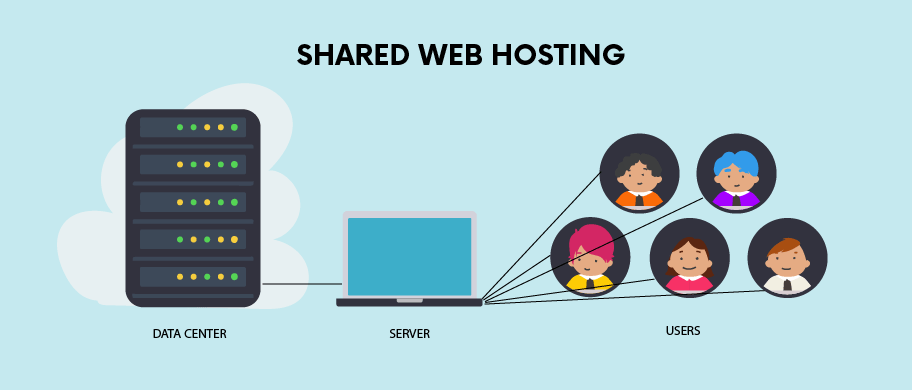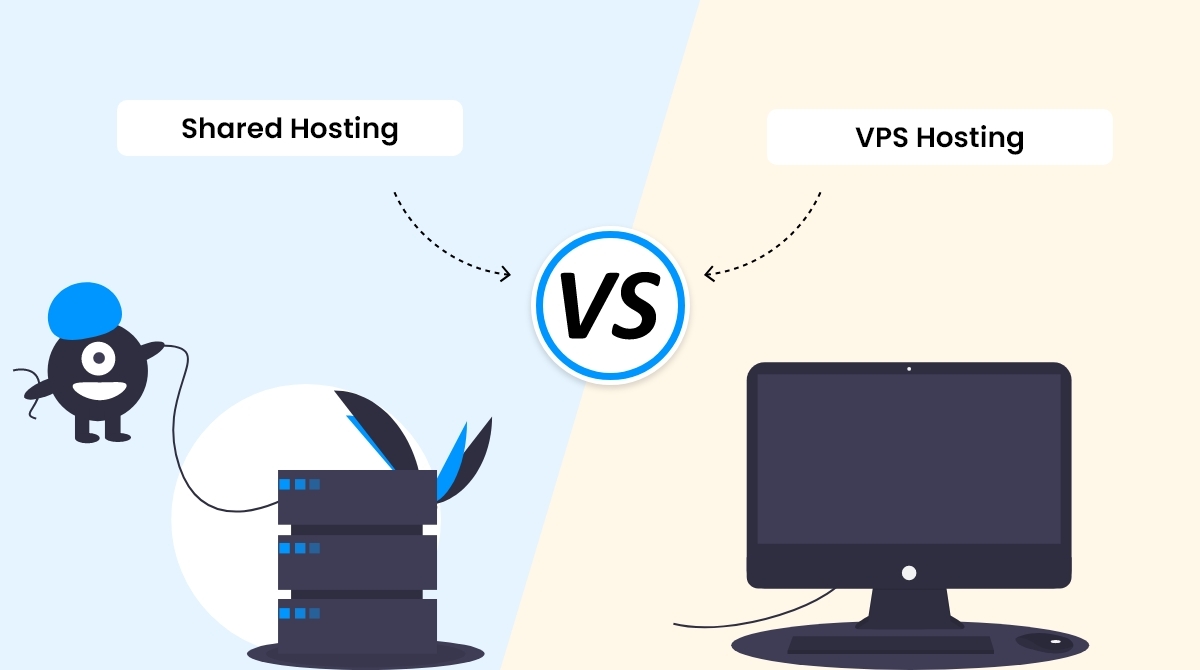
In essence, choosing between Shared and VPS hosting hinges on balancing needs against resources and customization. Shared hosting is cost-effective and easy for beginners, while VPS offers dedicated resources and control, let’s see brief about what is shred and vps hosting? its pros and cons and comparisons in detail.
What is Shared Hosting?

A shared web hosting service is a web hosting service where many websites reside on one web server connected to the Internet. The overall cost of server maintenance is spread over many customers. By using shared hosting, the website will share a physical server with one or more other websites. In this setup, the server’s resources (such as CPU, RAM, storage, bandwidth) are shared among all the websites that are hosted on it.
What is VPS hosting?

VPS (Virtual Private Server) hosting is a type of web hosting that uses virtualization technology to create isolated virtual servers within a single physical server. Each VPS operates independently, allowing users to have dedicated resources and greater control over their hosting environment compared to shared hosting.
VPS hosting is suitable for websites or applications that require more control, customization, reliability, and better performance than what shared hosting can offer. It’s a good choice for medium-sized businesses, growing websites, e-commerce platforms, or applications that need a more robust hosting environment without the cost of a dedicated server.
Comparison between Shared vs VPS

| Key Features | Shared Hosting | VPS Hosting |
| Security | Generally, very secure, but if one site on your server gets hacked, you’re at risk. | Can install personal security software to ensure you’re protected, even if others on your server aren’t. |
| Performance | Good uptime and enough bandwidth to support hundreds of visitors a week (provided other sites don’t use too much!). | Good page loading speeds, and enough bandwidth to support thousands of visitors every week. |
| Resource Allocation | Share resources with other websites on your server. If one reaches the limit, the others will also run out. | Resources are still shared, but you have a greater say over your website’s own personal limits. |
| Scalability | Not very scalable beyond static websites. | Capable of growing with your site, right up to massive corporate sites. |
| Set Up & Customization | Set limits on the amount of resources you have, very little customization. | More control over your resource limits; can be customized with extra software. |
| Pricing | The cheapest type of hosting on the market. | More expensive than shared hosting. |
Security
VPS hosting typically offers higher security due to isolated environments, minimizing vulnerabilities from neighboring accounts. Users have more control over configurations, enhancing security measures. In shared hosting, security relies on the hosting provider’s overall server management, making it more susceptible to risks from other users’ activities and potential vulnerabilities in shared resources. Vigilant monitoring and updates are crucial for maintaining security in both hosting types.
Resource Allocation
Everyone needs certain resources. Your mobile plan, for example, comes with a set limit on calls, texts and data. Hosting is the same, except the resources are things like storage space and memory.
As the name suggests, on a shared hosting plan, you share resources with the other sites on your server. If one website uses up too much bandwidth, the other sites will all suffer. It’s a bit like wanting to cook in your shared kitchen when all the hobs are already taken.
VPS hosting has few limitations. Because you hold a larger portion of the server’s hardware, you have more resource. You’ll also get root access over the server environment, which basically means you can install extra software and edit any file on the server.
Performance
VPS hosting provides consistent performance with dedicated resources, ensuring stability even during high traffic. Shared hosting, sharing resources among multiple sites, can experience performance dips if other users consume more resources, leading to potential slowdowns for all hosted sites.
Scalability
VPS hosting allows easy scalability, enabling users to quickly adjust resources like RAM or CPU based on needs. Shared hosting, constrained by shared resources, limits scalability options as users must adhere to the server’s allocated resources without individual adjustments.
Set Up & Customization
VPS hosting offers extensive customization with root access, allowing users to modify server settings and install software tailored to their needs. Shared hosting limits customization, providing predefined configurations managed by the hosting provider, simplifying setup but restricting deep customization options.
Your hosting configuration (set up) is usually taken care of for you. On shared hosting plans, set up is all sorted by your provider, meaning you can get on with more important things.
VPS is a little more complex. There are two different types of VPS hosting: Managed and Unmanaged. Managed plans are the same as shared hosting, in that the set up process is taken care of for you. With Unmanaged, it’s up to you – although this only tends to be used by developers and experts.
Pricing
Shared hosting is more budget-friendly due to shared resources, making it affordable for entry-level websites. VPS hosting costs more for dedicated resources and increased control. VPS offers scalability options but at a higher price point compared to the generally cheaper shared hosting plans.
Pros & Cons

Shared Hosting
Pros
- Affordability: Cost-effective for small websites and beginners.
- Ease of Use: Simple setup and management as the provider handles technical aspects.
- Low Maintenance: Hosting provider manages server upkeep and maintenance.
- Suitable for Low-Traffic Sites: Works well for sites with minimal traffic.
Cons
- Performance Variability: Shared resources can lead to performance issues during peak traffic on other sites.
- Limited Control: Users have limited control over server configurations and settings.
- Security Risks: Vulnerable to risks from other sites sharing the same server.
VPS Hosting
Pros
- Dedicated Resources: Ensures consistent performance and reliability.
- Scalability: Allows easy scaling of resources based on website needs.
- Customization: Offers full control over server settings and software installations.
- Enhanced Security: Isolated environments reduce risks from neighboring accounts.
- Reliability: Less susceptible to performance fluctuations caused by other users.
Cons
- Higher Cost: More expensive than shared hosting due to dedicated resources.
- Technical Knowledge Required: Requires some technical expertise for server management.
- Responsibility: Users are responsible for server configurations and maintenance.
Choosing between VPS and shared hosting depends on factors like website traffic, customization needs, budget, and technical expertise. VPS offers better performance and control but at a higher cost, while shared hosting is more affordable but lacks dedicated resources and customization options.
For more information
https://hostingchacha.com/tutorials
